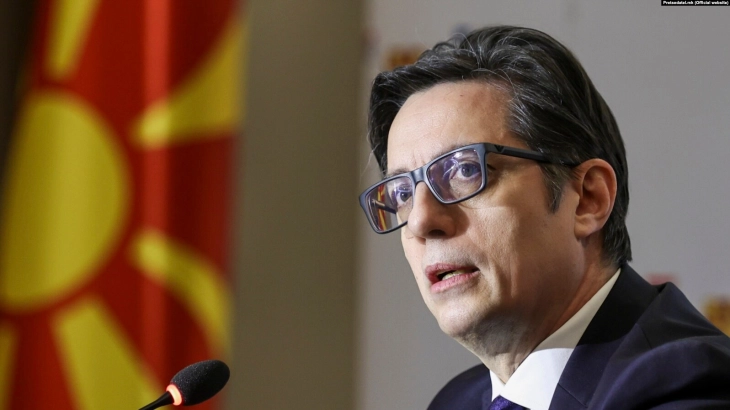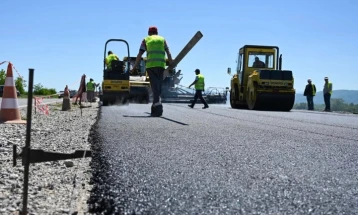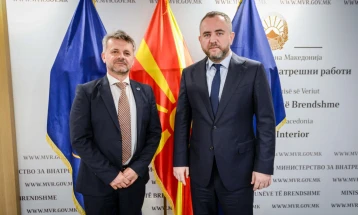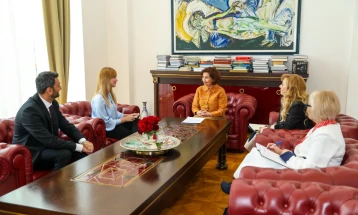Pendarovski: Signed decrees do not concern Bechtel-Enka contract
- The decrees I signed do not concern the contract between Government and Bechtel-Enka, nor do they concern the supervisory board charged with supervising the construction of the motorways which was the target of well-founded criticism from the public, President Stevo Pendarovski told Radio Free Europe.
- Post By Angel Dimoski
- 11:34, 4 June, 2023

Skopje, 4 June 2023 (MIA) – The decrees I signed do not concern the contract between Government and Bechtel-Enka, nor do they concern the supervisory board charged with supervising the construction of the motorways which was the target of well-founded criticism from the public, President Stevo Pendarovski told Radio Free Europe.
Regarding reports that by signing the decrees he wanted to secure political support from the ruling coalition for a second term, Pendarovski stressed that the decrees exclusively concern the contents of the five bills, and are in no way related to any other political or legal issue.
Pendarovski said the main reason he signed the Decree for the Labor Relations Law is because it didn’t contain the 60-hour workweek provision.
“Before the bills were submitted to Parliament I warned about the possibility of including the 60-hour workweek provision in the bill, and if that was the case I certainly wouldn’t have signed the decree, because the Constitutional Court already declared this provision as unconstitutional in 2022,” said Pendarovski.
Asked if the EU enlargement will accelerate due to the geopolitical context of the war in Ukraine, Pendarovski said he doesn’t believe in new forms of EU associations and memberships, stressing that the Macedonian citizens are tired of new methods for joining the EU.
“Three years ago, French President Macron requested a new methodology, which he said would be more efficient and far shorter. He said the countries would immediately feel the benefits of membership as they progress cluster by cluster. Unfortunately, until now, even the two Western Balkan countries who have been negotiating for more than a decade, Serbia and Montenegro, are practically yet to begin negotiations with the new methodology. We don’t need new forms of cooperation in that field so that we can become an EU member someday,” said Pendarovski.
The President said he believes there is momentum in the accession process, but doesn’t like the motivation behind it. “I wouldn’t like,” said Pendarovski, “seeing momentum for the accession of the Western Balkans, including Macedonia, just because there is a war somewhere on the continent.”
“If you give a candidate status to Ukraine, Moldova and Bosnia and Herzegovina, with certain conditions, because of the war in Ukraine, my question to the European officials would be what will happen when the war in Ukraine ends? I am afraid that this type of reasoning was never characteristic for the EU. This type of geostrategic reasoning, security threats, wars, new hybrid threats, is specific for NATO. The EU has always had a completely different profile of criteria for assessing potential members. What will we do if there is a ceasefire for that war? Will we lose the momentum?” said the President.
Asked how much Russia is involved in the dispute with Bulgaria, Pendarovski said, even if there is Russian influence, it is not as dominant in the narrative of the Bulgarian governments towards North Macedonia.
“My impression is that there are significant historical layers in the background of that dispute, on the Bulgarian side. Their rhetoric in the past 2-3 years is no different from the rhetoric when the country was a part of Yugoslavia and 30 years ago and 50 years ago,” said Pendarovski.
Regarding the events in the north of Kosovo, Pendarovski assessed that the NATO forces are enough to prevent a spillover of instability to the other parts of Kosovo and the region.
“The Alliance’s assessments are that the situation there, in the north of Kosovo, occasionally reaches a boiling point, however, the NATO forces, which will be strengthened, are enough to prevent a spillover of instability in the other parts of Kosovo, or other parts of the region,” said Pendarovski.
Photo: MIA Archive







